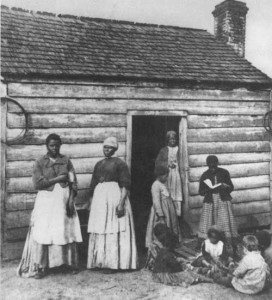NURTURING RECONCILIATION: BHM: History Matters so Don’t Believe the Hype
I have heard from multiple sources that Christianity was forced on slaves – that it was the white man’s religion. It was only given to black slaves to make them more docile. This is not the truth. The truth is religion is much more complex than that. The truth is the gospel is much more powerful than that. The conversion and embracing of Christianity by black slaves is not as clear cut as white slave owners trying to keep blacks docile. In fact Daniel Payne the Bishop of the African Methodist Episcopal Church from 1852-1893 paints a very different picture in his 1839 speech Slavery Brutalizes A Man:
In the year 1834, several colored brethren, who were also exhorters in the Methodist Episcopal Church commenced preaching to several destitute white families, who gained a subsistence by cultivating some poor lands about three or four miles from Charleston. The first Sunday I was present; the house was nearly filled with these poor white farmers. The master of the house was awakened to a sense of his lost condition. During the following week he was converted. On the third Sunday from the day he was convinced of sin he died in the triumphs of faith, and went to heaven.
The black slaves preached to poor white farmers. It wasn’t just a one way transmission. The gospel is much bigger than class and race. The message is big enough and transcendent enough for free men to accept it from those who are in bondage. And then he adds something else that clearly shows that preaching Christianity as a way to get slaves to submit was not popular in the antebellum South:
The objector may reply, that at the present moment there are four Methodist missionaries, and one Lutheran, laboring among the slave population of South Carolina. We answer, that this is true, and we are glad of it; but this fact does not overthrow our proposition, nor falsify what we have stated, for although a few planters have permitted the Gospel to be preached to their slaves, the majority of them prohibit it, and this permission is extraneous to slavery and is no part of its creed or code. Slavery never legislates for the religious instruction of slaves, but, on the contrary, legislates to perpetuate their ignorance; and there are laws this very moment in the statute books of South Carolina and other states, prohibiting the religious instruction of slaves. But this is not all that slavery does to subvert the moral government of God. The slaves are sensible of the oppression exercised by their masters; and they see these masters on the Lord’s day worshiping in his holy Sanctuary. They hear their masters professing Christianity; they see their masters preaching the Gospel; they hear these masters praying in their families, and they know that oppression and slavery are inconsistent with the Christian religion; therefore they scoff at religion itself-mock their masters, and distrust both the goodness and justice of God. Yes, I have known them even to question His existence. I speak not of what others have told me, but of what I have both seen and heard from the slaves themselves
In South Carolina slaves were prohibited from receiving religious instruction. The masters wanted to keep Christianity away from them. Maybe because following Christ encourages you to read and think for yourself. Maybe because following Christ places all people as equals. Maybe because following Christ flies totally in the face of oppression and injustice. Maybe just maybe we have this whole “Christianity was forced on the slaves” idea wrong.
_________________________________________
About the Author:
As a young kid Ramon Mayo grew up in South Central during the crack era of the late 80’s/early 90’s. He has been a hip hop artist, a pentecostal preacher, a missionary to Ethiopia, the pastor of a multiethnic Vineyard church, and now I am a writer/editor and speaker. Ramon lives with his wife Yvette and three wonderful children in Chicago, Illinois and attend the South Suburban Vineyard Church.

